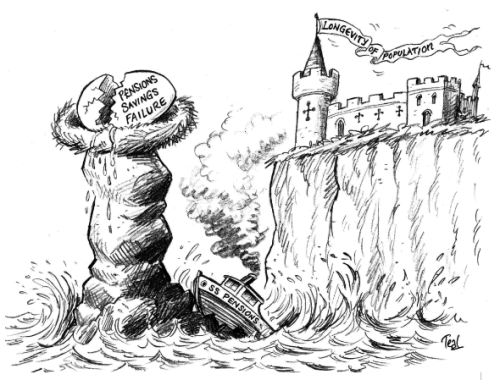A lot has been written about the ongoing pensions crisis, but it is no bad thing to look at the basic problems anew. There are dual factors which challenge the viability of a comfortable retirement for millions of pensioners who fall between ‘a rock and a hard place’. The ‘rock’ on the one side is the failure of personal pension saving. Gordon Brown’s tax raid in 1997 was just one of many ill-conceived policies from Westminster that have curbed the retirement savings habit. Those who do save, scarred maybe by the dot com crash and the ongoing world financial crisis, have a tendency to put their money in cash, rather than lower risk equities which should at least beat inflation.

Overriding this is the immense irresponsibility of successive governments, over many years, which have failed to prioritise pensions savings. The hard place is rising longevity. In 1951 a man aged 65 could expect on average to live to the age of 77. Today he can expect to live to 86, rising to 91 for someone who is 65 in 2050. The rise in centenarians is equally remarkable. Today there are 16,000 people in UK aged over 100. That figure is up from 6860 in 2000 and is expected to rise to 277,000 by 2050. The impact on society will be huge; in fact the symptoms are already showing. Over a million people of pensionable age are still working. For some the decision is a choice, but for many it is a necessity. And this of course does nothing to alleviate the unemployed situation. Perceived wisdom is to start saving as young as possible for as much as possible, but this does not help today’s 50 year olds – and it could be up to 50 years before they work their way through the system. It is difficult to exaggerate the impact that an ageing population, who cannot afford to fund an acceptable retirement, is going to have on the nation.
The above is the lead article in our monthly News Notes. Please click here for information regarding these notes.
